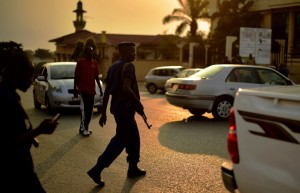Violence as Burundi votes with president seeking re-election

A Burundian policeman walks at the scene of a grenade attack in Bujumbura on July 20, 2015. Presidential elections are due to be held in the country on July 21, 2015. Opposition groups say if Burundi’s President, Pierre Nkurunziza is seeking another term it would violate a peace deal that paved the way to end a dozen years of civil war in 2006. AFP PHOTO / CARL DE SOUZA
BUJUMBURA, Burundi — Burundians voted Tuesday amid gunfire and grenade blasts, with President Pierre Nkurunziza widely expected to win a third consecutive term despite international condemnation and thousands of people fleeing feared violence.
At least two people — a policeman and a civilian — were killed in a string of explosions and gunfire overnight Monday, with blasts and shootings heard as polls opened shortly after dawn in the capital Bujumbura, the epicenter of three months of anti-government protests.
Willy Nyamitwe, Nkurunziza’s chief communications advisor, condemned the attacks as “terrorist acts” aimed at “intimidating voters.”
Opposition and civil society groups have denounced Nkurunziza’s candidacy as unconstitutional and a violation of a peace deal that ended a dozen years of civil war and ethnic massacres in 2006.
Around 3.8 million Burundians are eligible to vote between 06:00 (0400 GMT) and 16:00 (1300 GMT).
Article continues after this advertisementUN Secretary General Ban Ki-moon urged calm, calling on all sides to “refrain from any acts of violence that could compromise the stability of Burundi and the region.”
Article continues after this advertisementCritics fear a win by the incumbent will be a hollow victory, leaving him ruling over a deeply divided nation.
“Despite a facade of pluralism, this is an election with only one candidate, where Burundians already know the outcome,” said Thierry Vircoulon from the International Crisis Group, a think-tank that has warned the situation has all the ingredients to kick-start renewed civil war.
With the elections denounced by the opposition as a sham, the 51-year-old president — a former rebel, born-again Christian and football fanatic — is facing no serious competition.
– Explosions, gunfire –
Anti-Nkurunziza protests have been violently repressed, leaving at least 100 dead since late April.
Independent media has been shut down and many opponents have fled — joining an exodus of over 150,000 ordinary Burundians who fear their country may again be engulfed by widespread violence.
Doctors Without Borders (MSF) said Monday around a thousand people were fleeing each day into Tanzania, crossing the border “through the forest … many traveling in the dark on foot and without belongings.”
In mid-May, rebel generals attempted to overthrow Nkurunziza in a coup. After that failed, they launched a rebellion in the north of the country.
Last-ditch crisis talks mediated by Uganda broke down on Sunday.
“The government has opted to isolate itself and go ahead with pseudo-elections,” said Leonce Ngendakumana, a prominent opposition figure, after talks collapsed.
“They have refused to save Burundi from sliding into an abyss,” said another opposition figure, Jean Minani.
A poor and landlocked former Belgian colony, Burundi is situated in the heart of central Africa’s troubled Great Lakes region.
Analysts say renewed conflict in the country could reignite ethnic Hutu-Tutsi violence and bring another humanitarian disaster on the region.
The conflict also risks drawing in neighboring states — much like in the war-torn east of Democratic Republic of Congo.
The last civil war in Burundi left at least 300,000 dead.
Nkurunziza’s CNDD-FDD party scored a widely-expected landslide win in parliamentary polls held on May 29 that were boycotted by the opposition and condemned internationally as neither free nor fair.
UN electoral observers — the only international monitors in Tuesday’s polls — said the last round of voting took place in a “climate of widespread fear and intimidation.”
The results of parliamentary polls took a week to be announced.
The presidential elections are likely to be seen in the same light, diplomats said, meaning Nkurunziza — whose nation is heavily aid-dependent — will probably also face international isolation.